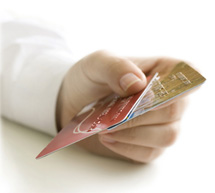 I've always been very careful to live within my means and not take on any significant amount of debt but around six months back, I learned the hard way that this isn’t always enough to keep you in the black. My beloved cat suddenly got very sick and I instinctively knew that I’d do whatever it took to help her. Everything seemed to happen all too quickly and she passed away a couple of weeks later, at which point I’d charged my emergency-only credit card for $1,500 on tests, treatment and medication for her various ailments.
I've always been very careful to live within my means and not take on any significant amount of debt but around six months back, I learned the hard way that this isn’t always enough to keep you in the black. My beloved cat suddenly got very sick and I instinctively knew that I’d do whatever it took to help her. Everything seemed to happen all too quickly and she passed away a couple of weeks later, at which point I’d charged my emergency-only credit card for $1,500 on tests, treatment and medication for her various ailments.
For most people, the prospect of paying this off wouldn’t be a huge problem - you’d just work out how much you could take from your monthly paychecks and throw that at the debt, right? Unfortunately for me, I’m self-employed and don’t have a set income. Sure, I have a few clients who pay me regularly but generally speaking, I can’t say with any certainty how much I’ll earn month to month. Even worse, being self-employed means that it’s not always in your hands even if you’ve got a great idea of how much you’re going to be invoicing for. If a particular client is late paying up or doesn’t want to pay at all, it’s even more difficult to find available money to pay off debt. In that kind of situation, even paying your rent/mortgage bills and putting food on the table can be challenging enough.
Still, it’s by no means impossible to get out of debt when your income is all over the place. My debt isn’t yet fully paid off but I’ve cleared all but $150 of the original total by utilizing the following methods:
Budgeting. Once my regular expenses were accounted for, I intended to throw literally every ‘spare’ cent towards the credit card debt. In the short term, that would obviously mean no scope for luxuries and treats that aren’t strictly essential, but it’d be worth it to know that interest payments are reduced. Of the five months that I’ve been repaying the debt, the joys of being self-employed means that only two of these months have left me with surplus cash to actually follow through on this plan.
I have a separate account that I treat as being somewhere between checking and savings and which I use to take care of regular expenses if my income for that particular month doesn’t stretch far enough. For three of the five months, I’ve borrowed money from that account to use towards debt repayments. Obviously this isn’t an ideal situation but I prefer to do that than let interest build up and prolong the debt even further.
Second income. In the early days of repaying the debt, I searched high and low for a part-time job that I could fit around my freelance work to secure a bit more money to throw at the debt. I found some work as a bartender and this worked well for a couple of months, until the onset of a recurrent family illness forced me back to working solely from home again. Even though it didn’t amount to all that much in comparison to my freelance work, the fact that it was regular and fixed was a huge help towards the debt repayment.
Other options
Using savings. If you can take money out of a savings account without incurring penalties, you can use this for debt repayment and pay yourself back once the debt is cleared. This would have been my top choice if I hadn’t tied up the bulk of my savings. Needless to say, I’m on the hunt for a savings account that offers easier access now that I’ve been burned with unexpected debt and know how easy it would be for a similar medical expense to crop up in the family.
What are your tips for paying down debt on an erratic income, particularly long-term debt?
Subscribe to:
Post Comments (Atom)

That's something I seriously worry about if I were to ever quit my job! Thanks for the tips! I'd also suggest finding anything you could sell...old cd's, sports equipment you aren't using, etc. Not only does this help de-clutter your life, but it might be a relatively quick way to reduce your sudden debt.
I think that having the separate account for surpluses is a great idea!
Also, you may consider providing incentives for your clients for paying early (like 10% off or something). The avoided interest (and subsequent compounded interest) can help to make up for the discount that you offered.
Great tips! For suggestions I was going to say you could sell some things or build up your savings until you have at least 6 months of expenses in there. Of course when you have an emergency that doesn't help, but at least you have those 6 months of expenses there. Until then, try to function below your means and hold off on certain purchases.